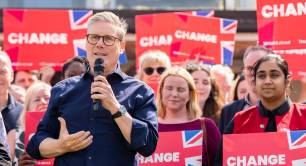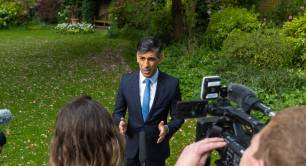The Editor's Post: Behind-the-scenes political manoeuvrings as UK election looms

Organisations in the UK's social economy are subtly changing their tone as the country prepares to change government – and there's a good reason why they need to do this. This week's view from the Pioneers Post newsroom.
It’s not something big figures in the social economy like to talk about publicly, but yesterday in the Pioneers Post newsroom we were discussing how impact organisations in the UK seem to subtly change their tone according to who leads (or is about to lead) the country. With the Labour party expected to have a record majority in parliament, it does look like they’re repositioning themselves for a big change in priorities.
I spoke to half a dozen impact leaders this week for an analysis of what is – and isn’t – in this year’s party manifestos released ahead of the upcoming general election. Almost all of the conversations I’ve had started with a disclaimer: we’re not taking sides in politics. These organisations keep emphasising that they’re non-partisan for a reason: they need the government on their side to create the right environment for them to thrive – and because impact takes time, they also need to outlive governments to fulfil their mission.
All over the world, states function with short-term funding plans and electoral cycles of a few years, but impact creation takes much longer than that.
Nick Temple from Social Investment Business reminded me that the Future Builders programme started in 2004, with beneficiaries still repaying their loans more than 15 years later. Big (now Better) Society Capital was a project that was conceived under a Labour government, but launched by a Liberal-Democrat-Conservative coalition, with prime minister David Cameron conveniently taking ownership of it as part of his “Big Society” policy (hence the original name of the organisation).
While, all over the world, states function with short-term funding plans and electoral cycles of a few years, impact creation takes much longer than that. That’s why it’s so important that the impact community shows policymakers how they can play a part in what they’re trying to achieve, tweaking their discourse according to the priorities of the government of the day.
For example, the impact sector can help a government that wants to increase the role of the private sector in the delivery of public services to save money; it can also help a government that wants a bigger role for the state but needs to find strategic partners to deliver ambitious social and environmental pledges. Impact organisations just need to speak the right language so that policymakers understand their potential – remember when everyone was talking about “levelling up” in the UK?
 There’s also more practical repositioning. Better Society Capital changed its name just a few weeks ago – its former name, “Big Society Capital”, was still associated with Cameron’s “Big Society” project. (Better Society Capital doesn’t officially say that’s the motivation behind the rebrand, but people with knowledge of the matter told me it was part of it and founding chair, Sir Ronald Cohen, made it clear in an interview with The Times).
There’s also more practical repositioning. Better Society Capital changed its name just a few weeks ago – its former name, “Big Society Capital”, was still associated with Cameron’s “Big Society” project. (Better Society Capital doesn’t officially say that’s the motivation behind the rebrand, but people with knowledge of the matter told me it was part of it and founding chair, Sir Ronald Cohen, made it clear in an interview with The Times).
Meanwhile, insiders at one major social funder told me, months ago, that they’d shifted their lobbying focus from Conservative to Labour MPs – because they had to look ahead long term and it was becoming increasingly clear the Tory regime was nearing its end.
In any case, there’s much to do for social organisations to reach out to politicians: the phrases “social enterprise”, “social investment” or “impact investing” don’t appear in any of the main parties’ manifestos this year. Should we worry? Find out in our story this week.
We’re getting ready for the SE100 Awards!
Today we reveal the finalists for our annual SE100 Awards, celebrating the UK’s best social enterprises, which we run with NatWest Social & Community Capital. The top 100 social enterprises will be unveiled during the coming weeks, culminating in the awards ceremony on 16 July in London. We’re looking forward to seeing many members of the Pioneers Post community there.
Top stories
The 2024 UK election manifestos: slim pickings for the social economy?
Opinion: We need more LGBTQ+ social enterprises – here’s why
NatWest SE100 Social Business Awards 2024 finalists announced
Top image: Keir Starmer, Angela Rayner, Rachel Reeves and campaigners in front of the Labour campaign bus on 1 June 2024. Credit: Labour Party/Keir Starmer on Flickr.
Thanks for reading Pioneers Post. As an entrepreneur or investor yourself, you'll know that producing quality work doesn't come free. We rely on our subscribers to sustain our journalism – so if you think it's worth having an independent, specialist media platform that covers social enterprise stories, please consider subscribing. You'll also be buying social: Pioneers Post is a social enterprise itself, reinvesting all our profits into helping you do good business, better.



